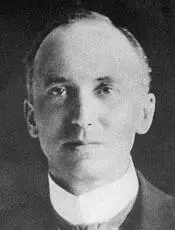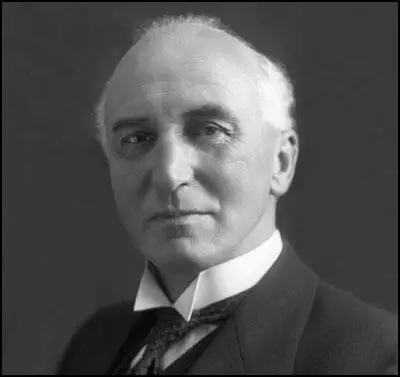John Simon

John Simon was born in Manchester on 28th February 1873. He attended Oxford University and while there became president of the Oxford Union.
After leaving university he became a highly successful lawyer. A member of the Liberal Party Simon was elected to represent Walthamstow in the 1906 General Election. In 1910 Herbert Asquith appointed him solicitor-general. This was followed with the post of attorney-general (1913-1915) and home secretary (1915-1916).
Simon favoured a negotiated end to the First World War and resigned in January 1916 over the issue of conscription. As a result of this stand he lost his seat in the 1918 General Election. He returned to the House of Commons in 1922 and chaired the commissions on the Indian Constitution (1927-30) and the R101 Airship Disaster (1930-31).
In 1931 Simon resigned from the Liberal Party and formed the Liberal National Party. Simon supported James Ramsay MacDonald and his National Government and was rewarded with the post of foreign secretary (1931-35). He also served as home secretary under Stanley Baldwin and chancellor of the exchequer under Neville Chamberlain.

In his first budget of the Second World War Simon increased the standard rate of income tax from five shillings and sixpence to seven shillings. An extra penny was added to the tax on a pint of beer. There were also extra taxes on sugar and tobacco. Simon also introduced a new Excess Profits Tax of 60 per cent on the war industries.
In April 1940 Simon introduced a new budget. The standard rate of income tax was increased from seven shillings to seven shillings and sixpence. An extra penny was added to the tax on a pint of beer. There were also extra taxes on tobacco. The most controversial measure was to increase postal charges. This especially upset members of the armed forces who were serving abroad as they feared it might reduce the number of letters they received from their families.
Simon was one of the key minister involved in persuading Neville Chamberlain to resign. After Winston Churchill gained power in May 1940, Simon was replaced as chancellor of the exchequer by Kingsley Wood. However, Simon remained in the government as lord chancellor.
Sir John Simon, 1st Viscount Simon, died on 14th September 1954.
Primary Sources
(1) Charles Repington, diary entries (January 1916)
Wednesday, January 5th: Went down to hear the P.M (Asquith) bring in the Compulsion Bill. Had a seat under the clock in the Sergeant-at-Arms' box. A packed house. The P.M. very quiet and undemonstrative. He spoke so low that he was invited to speak up. A great want of magnetism, and judged by this speech his powers are failing, but it may be only a trick. He gave no explanations of the military necessity for the Bill, but restricted himself to the political side, to his pledge, and to the terms of his Bill. Sir John Simon, who has happily left the Government, got up next and made an unhappy speech for a Minister who has had all the facts before him. He was cheered by the riff-raff of the Left, but he made a bad impression.
Thursday, January 6th: The Bill passes first reading, majority 298. Bonar Law, Ward, Barnes, Samuel, and Balfour made the most effective speeches. The Labour Conference passes a resolution by a supposed large majority against Compulsion.
(2) A. J. P. Taylor, Origins of the Second World War (1961)
In the evening of 2 September Chamberlain was still entertaining the House of Commons with hypothetical negotiations: "If the German Government should agree to withdraw their forces then His Majesty's Government would be willing to regard the position as being the same as it was before the German forces crossed the Polish frontier. That is to say, the way would be open to discussion between the German and Polish Governments on the matters at issue." This was too much even for loyal Conservatives. Leo Amery called to Arthur Greenwood, acting leader of the Opposition: "Speak for England", a task of which Chamberlain was incapable. Ministers, led by Simon, warned Chamberlain that the government would fall unless it sent an ultimatum to Hitler before the House met again.
Though Hitler blundered in supposing that the two Western Powers would not go to war at all, his expectation that they would not go to war seriously turned out to be correct. Great Britain and France did nothing to help the Poles, and little to help themselves.
(3) Henry (Chips) Channon, diary entry (14th September, 1939)
The first war budget. At 3.45 Simon rose (he was directly in front of me) and in unctuous tones not unlike the Archbishop of Canterbury, opened his staggering budget. He warned the House of its impending severity yet there was a gasp when he said that Income Tax would be 7/6 in the £. The crowded House was dumbfounded, yet took it good-naturedly enough. Simon went on, and with many a deft blow practically demolished the edifice of capitalism. One felt like an Aunt Sally under his attacks (the poor old Guinness trustee, Mr Bland, could stand it no more, and I saw him leave the gallery) blow after blow; increased surtax; lower allowances; raised duties on wine, cigarettes and sugar; substantially increased death duties. It is all so bad that one can only make the best of it, and re-organise one's life accordingly.

